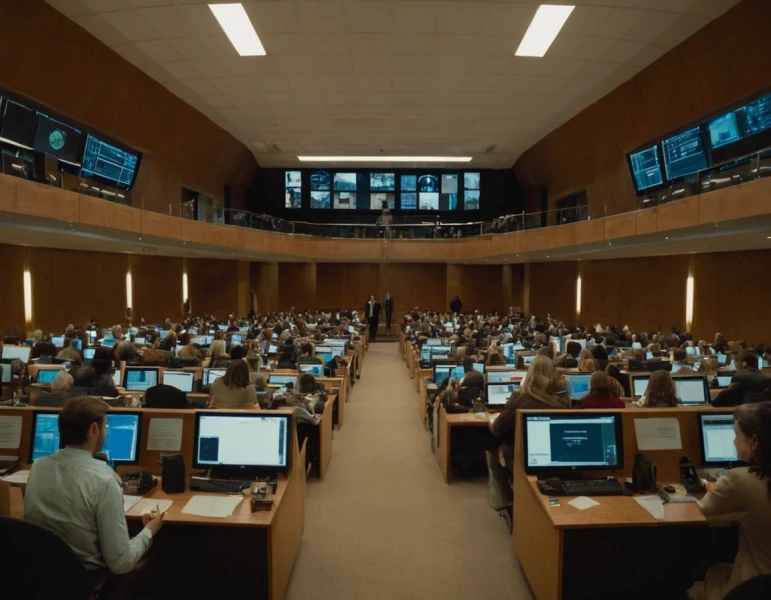Educa UNIVERSITY|SCIENCE AND ENGINEERING
Faculty of Information Sciences: A Personal Experience
Related Masters
Faculty of Information Sciences: A Personal Experience
Hello, I'm Amadeo Pérez, and I'm going to talk to you from my experience with the Faculty of Information Sciences. Throughout my life, I have had the good fortune (or misfortune, depending on the day) to be deeply involved with this discipline, which has allowed me to know it from the inside and analyze it with perspective. In this article, I'll tell you what the School of Information Sciences is, its impact on today's world and why you should consider it if you are attracted to the world of communication, technology and knowledge.
What is the School of Information Sciences?
Let's start with the basics: a Faculty of Information Sciences is an academic institution dedicated to training in disciplines related to communication, journalism, advertising, public relations, and in some cases, librarianship and documentation. This body of knowledge is increasingly important in the digital world, where information is power and its proper management makes the difference between success and failure in many sectors.

The Faculty of Information Sciences at the Universidad Complutense de Madrid (UCM), one of the most renowned in Spain, stands out for its multidisciplinary approach, with degrees such as Journalism, Audiovisual Communication, and Advertising and Public Relations. In addition, its iconic, brutalist-style building has been part of films such as Tesis by Alejandro Amenábar.
Now, this is just the tip of the iceberg. Did you know that information science as a discipline has roots dating back to the 19th century? Yes, it is not a new science. From the invention of the first typewriters to the developments in Boolean algebra that gave rise to the search engines we use today, Information Science has been central to the way we manage, store and access data.
My relationship with the School of Information Science
You may be wondering how I got here. Well, it wasn't a straight path. In fact, I started in the world of letters, thinking I was going to be a novelist. However, I realized that the control of information and the ability to tell powerful stories across multiple media were what really moved the world. Thus, I ended up enrolling in the Faculty of Information Sciences, where I learned to use technology to connect with audiences, something that later led me to work in advertising and communication.
I have seen how theoretical knowledge combines with practice. From classrooms equipped with radio and television studios to research projects on the impact of social networks on modern societies, the Faculty offers a space to explore what it means to inform in the digital age. And believe me, this is not a minor fact.
The importance of the Faculty in the current context
If you are thinking about what to study, let me tell you something: the future is in information. It doesn't matter if you want to work in television, be the next community manager of a major brand or engage in big data research, Information Science is at the heart of all these disciplines.
Professionals trained in this faculty leave prepared for positions in media, advertising agencies, technology companies, and also in non-profit organizations where information management is essential. Not only will you be trained to handle data, but you will know how to create narratives that make an impact.
The academic environment and its evolution
The Faculty of Information Sciences has evolved enormously since its beginnings. At Complutense, for example, they have recently modernized their computer classrooms and have new radio studios. This reflects the faculty's ability to adapt to new market demands.
When I was studying, we didn't have so many technological tools, but now things have changed. Students have access to specialized software, multimedia labs and classrooms with state-of-the-art equipment - everything you need to be a competitive professional!
In addition, the Faculty offers a wide variety of extracurricular activities, from international congresses to exhibitions commemorating the history of the building and its alumni. Did you know that several prominent journalists and film directors came out of here? The cultural atmosphere is impressive!
The current challenges of the Faculty of Information Sciences
Of course, not everything is rosy. Over the years, I have seen how the Faculty of Information Sciences has had to face several challenges. One of the biggest is the rapid evolution of information technologies. New tools and platforms emerge every day, and university training sometimes struggles to keep pace.
Another major issue is accessibility. The brutalist faculty building in Madrid, while an architectural gem, is notoriously difficult for people with disabilities to navigate. This is something that needs to be addressed in the future if the university is to be a more inclusive space.
Why study Information Science?
In closing, I will tell you that studying Information Science is one of the smartest decisions you can make. We live in the information age and those who know how to manage it have a huge competitive advantage. Whether you are interested in communication or technology, this faculty will prepare you to face the challenges of the future.
In short, if you have a passion for communication, technology and data analysis, look no further. The Faculty of Information Sciences offers you the perfect place to develop your full potential.
Faculties
Trainings
The faculties embrace diverse academic disciplines and fields of study, opening doors to new perspectives and exploring different spheres of wisdom in a constantly evolving world.














